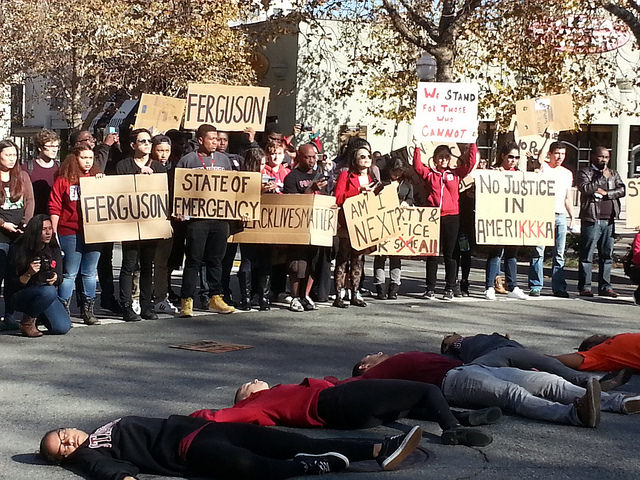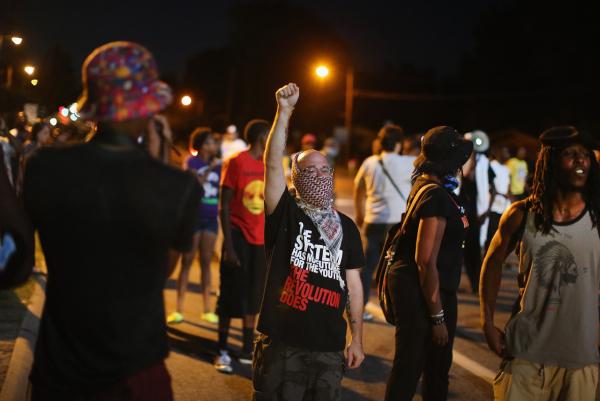By Brian Kaylor
The Aug. 9, 2014, death of Michael Brown in Ferguson, Mo., the killing of others elsewhere at the hands of white police officers and the recent massacre of nine African-American churchgoers by a white supremacist have grabbed public attention to issues of racism, violence and injustice.
Many Baptists have joined the discussion and in efforts help heal these divisions.
“The racial divide, not just in St. Louis but across the nation … is a real issue that needs to be faced head-on,” said Jim Breeden, executive director of St. Louis Metro Baptist Association. He said he hopes churches will not try “ignoring it or acting like it does not exist.”
Breeden rejects the idea that events in Ferguson and the similar killing in Baltimore reversed race relations.
“I believe they just simply revealed where we really were, that many of us were living with a false perception,” he said. “I am encouraged that we are almost forced to deal with the divide.”

Baptists have held prayer meetings, special services and community cleanups in the aftermath of events in Ferguson, Breeden noted.
“We must be intentional and go to areas we’ve not gone before,” he added. “In this day and age, it’s a sin if white pastors and church leaders do not have African-American friends and are not breaking bread together and our families getting together. We need to build intentional relationships in our personal lives, our families and our churches.”
Harry Riggs, pastor of First Baptist Church in Lincoln, Neb., said churches must have conversations about race, but warns, “It will be hard.”
When the predominately white American Baptist congregation called him as pastor 10 years ago, he wondered if they were really ready for an African-American pastor. Over the years, as the church transitioned to a more multicultural congregation, both he and the church changed.
Riggs noted that they have worked “not to just sweep [racial differences] under the rug but actually lean into them.” He added that “you can’t skip over the pain” in the search for unity.
“Racial reconciliation is not the right term for America because there has never been a time in America where race was not an issue of above-and-below, or power-and-injustice,” he said. “We’ve never been ‘conciled,’ we’ve never had a conciliatory relationship to begin with.”
The right term, he said, is racial redemption.
“We have to, as a church, let God redeem us,” Riggs said.
Baptists must consider carefully how their understanding of Jesus’ return impacts their thinking and actions on difficult issues like racial redemption.
“Our eschatology makes a difference,” he said. “If our eschatology simply is ‘come, Lord Jesus, come’ and the world is going to get worse and worse and worse … then we’re not going to do anything.”
Riggs hopes Baptists instead hold an eschatology where “God wants to partner with us to be his redemptive agents in the world and, therefore, I need to do my little part.”
They must also question what their view of the end times says about how they are living right now.
“Jesus is going to pull us out of this mess versus Jesus is coming back, but he’s looking for laborers who’ve been faithful in the work,” he said.

To observe the one-year anniversary of the Michael Brown shooting, Central Baptist Theological Seminary will host worship and dialogue in St. Louis. “A Day of Hope: One Year Later.” will take place Aug. 8 at Third Baptist Church.
The event will include a screening of the EthicsDaily.com film “Beneath the Skin: Baptists and Racism.”
Speakers include Terrell Carter, a former police officer who now serves in various ministry and community roles; Lornetta Chaney-Jones, who teaches English in at a St. Louis public school; and Molly Fleming, who leads a national faith-based effort to end predatory lending.
Carter sees the event as a way to increase dialogue among Baptists on issues of racism, policing and justice.
“Within a safe and supportive environment, the event will offer people the opportunity to engage in conversation centered around the events that helped to spark national debate over police-citizen relations,” he said.
Attendees will connect “with a diverse group of Baptists” and “learn about community-based resources and strategies that can help with future conversations and ongoing concerns related to race and ethnicity,” he said.
Carter hopes “Baptists of all kinds” will “be honest with each other and take tangible steps to work together.”
Churches cannot afford to act as if they exist in a vacuum or are singlehandedly fighting these battles alone, he said. Carter added that he remains “discouraged by the overwhelming silence” of many churches.
“I understand that some of these hot-button issues are not a daily concern for certain congregations,” he said. “But it has been disappointing to know that many of our affluent brothers and sisters, whether black or white, have essentially said, ‘That’s their problem, not ours.’”
Christians must remember that their actions or inaction impact others.
“We seem disconnected from each other and forget that what affects one part of the body will have an influence on the health of the body overall,” Carter said.
